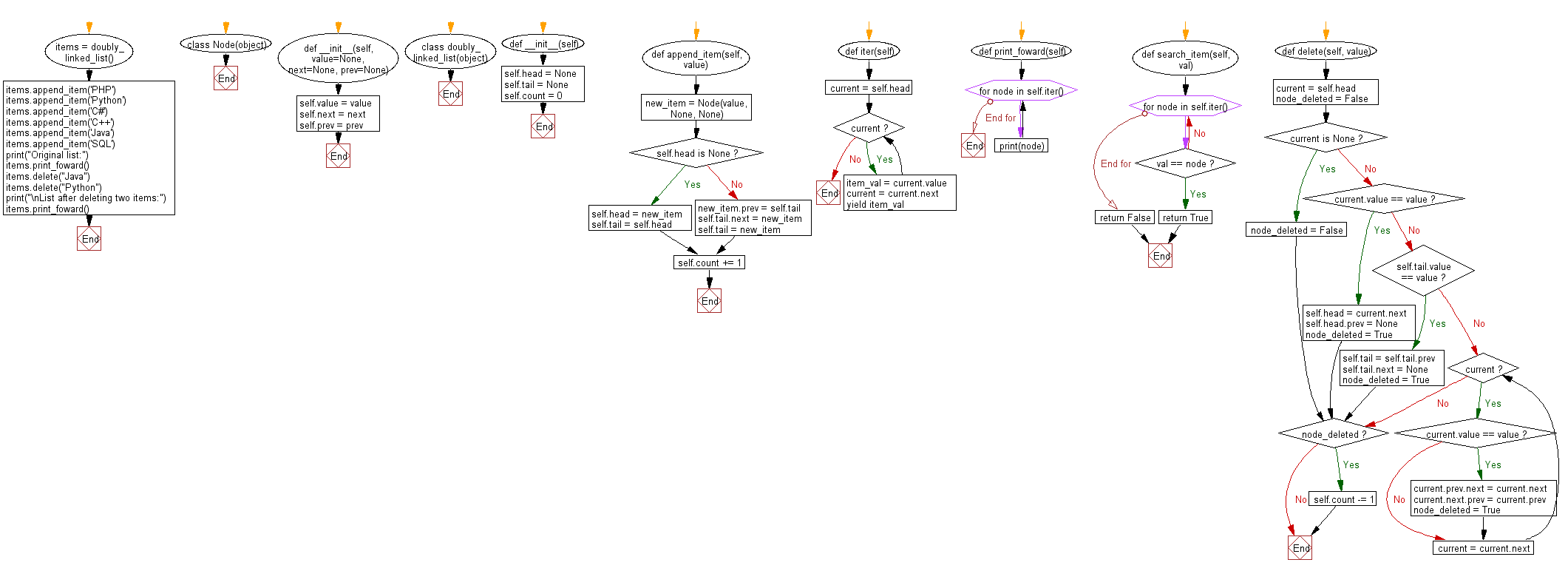Python Linked List: Delete a specific item from a given doubly linked list
Python Linked List: Exercise-14 with Solution
Write a Python program to delete a specific item from a given doubly linked list.
Sample Solution:-
Python Code:
class Node(object):
# Singly linked node
def __init__(self, value=None, next=None, prev=None):
self.value = value
self.next = next
self.prev = prev
class doubly_linked_list(object):
def __init__(self):
self.head = None
self.tail = None
self.count = 0
def append_item(self, value):
# Append an item
new_item = Node(value, None, None)
if self.head is None:
self.head = new_item
self.tail = self.head
else:
new_item.prev = self.tail
self.tail.next = new_item
self.tail = new_item
self.count += 1
def iter(self):
# Iterate the list
current = self.head
while current:
item_val = current.value
current = current.next
yield item_val
def print_foward(self):
for node in self.iter():
print(node)
def search_item(self, val):
for node in self.iter():
if val == node:
return True
return False
def delete(self, value):
# Delete a specific item
current = self.head
node_deleted = False
if current is None:
node_deleted = False
elif current.value == value:
self.head = current.next
self.head.prev = None
node_deleted = True
elif self.tail.value == value:
self.tail = self.tail.prev
self.tail.next = None
node_deleted = True
else:
while current:
if current.value == value:
current.prev.next = current.next
current.next.prev = current.prev
node_deleted = True
current = current.next
if node_deleted:
self.count -= 1
items = doubly_linked_list()
items.append_item('PHP')
items.append_item('Python')
items.append_item('C#')
items.append_item('C++')
items.append_item('Java')
items.append_item('SQL')
print("Original list:")
items.print_foward()
items.delete("Java")
items.delete("Python")
print("\nList after deleting two items:")
items.print_foward()
Sample Output:
Original list: PHP Python C# C++ Java SQL List after deleting two items: PHP C# C++ SQL
Flowchart:

Python Code Editor:
Contribute your code and comments through Disqus.
What is the difficulty level of this exercise?
Test your Programming skills with w3resource's quiz.
Python: Tips of the Day
Find current directory and file's directory:
To get the full path to the directory a Python file is contained in, write this in that file:
import os dir_path = os.path.dirname(os.path.realpath(__file__))
(Note that the incantation above won't work if you've already used os.chdir() to change your current working directory, since the value of the __file__ constant is relative to the current working directory and is not changed by an os.chdir() call.)
To get the current working directory use
import os cwd = os.getcwd()
Documentation references for the modules, constants and functions used above:
- The os and os.path modules.
- The __file__ constant
- os.path.realpath(path) (returns "the canonical path of the specified filename, eliminating any symbolic links encountered in the path")
- os.path.dirname(path) (returns "the directory name of pathname path")
- os.getcwd() (returns "a string representing the current working directory")
- os.chdir(path) ("change the current working directory to path")
Ref: https://bit.ly/3fy0R6m
- New Content published on w3resource:
- HTML-CSS Practical: Exercises, Practice, Solution
- Java Regular Expression: Exercises, Practice, Solution
- Scala Programming Exercises, Practice, Solution
- Python Itertools exercises
- Python Numpy exercises
- Python GeoPy Package exercises
- Python Pandas exercises
- Python nltk exercises
- Python BeautifulSoup exercises
- Form Template
- Composer - PHP Package Manager
- PHPUnit - PHP Testing
- Laravel - PHP Framework
- Angular - JavaScript Framework
- Vue - JavaScript Framework
- Jest - JavaScript Testing Framework
